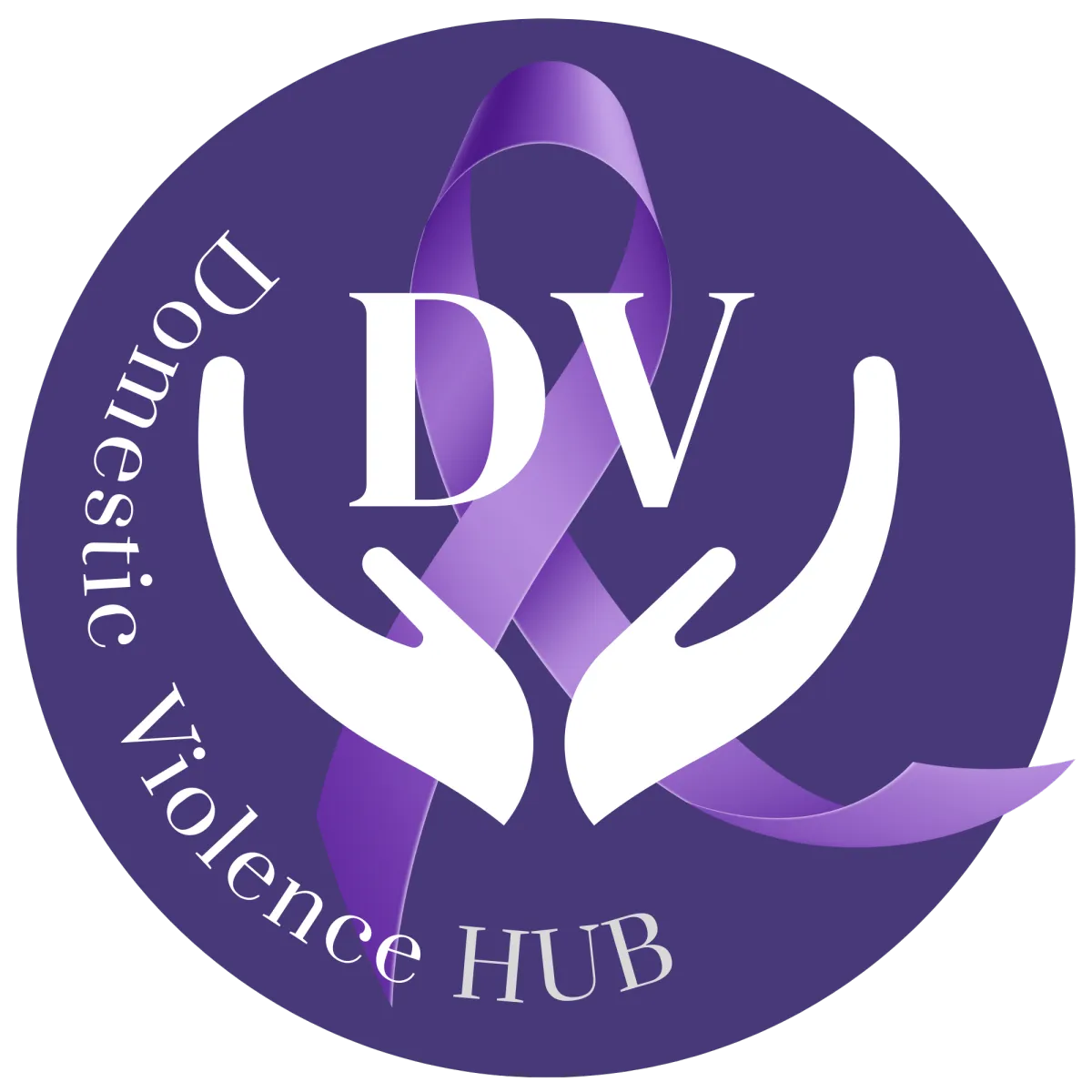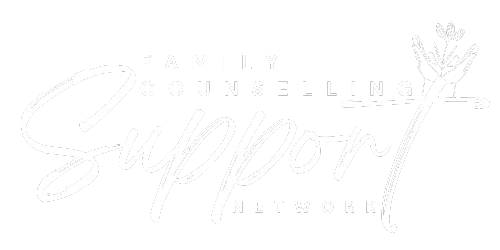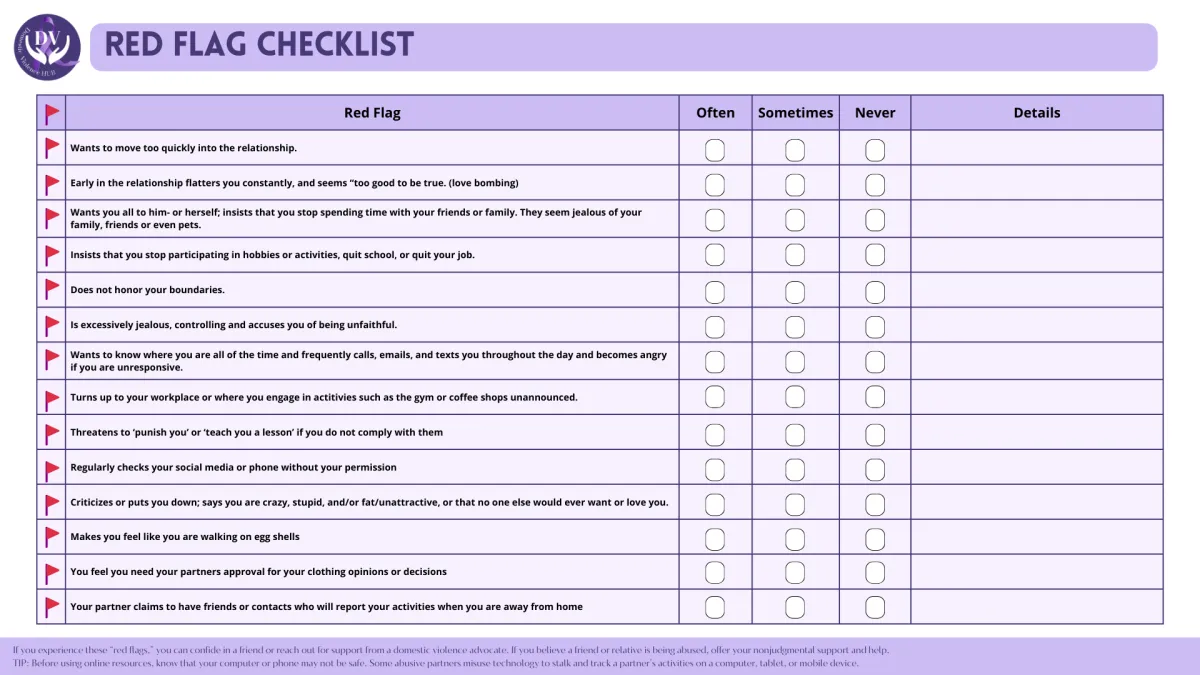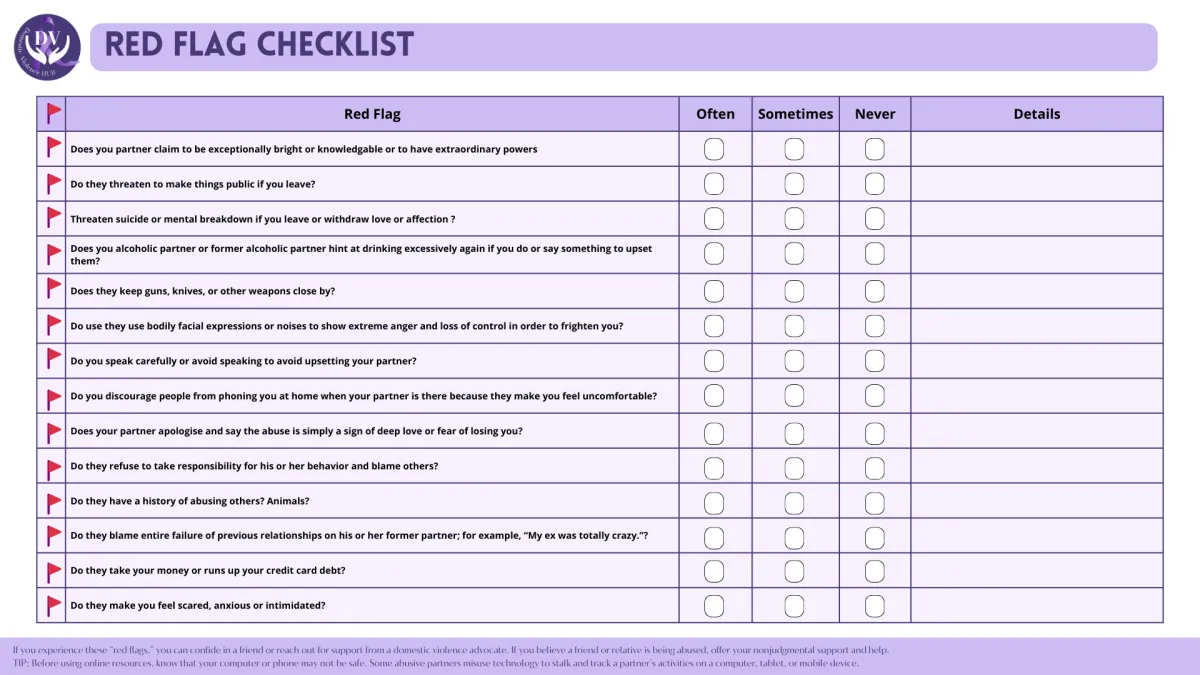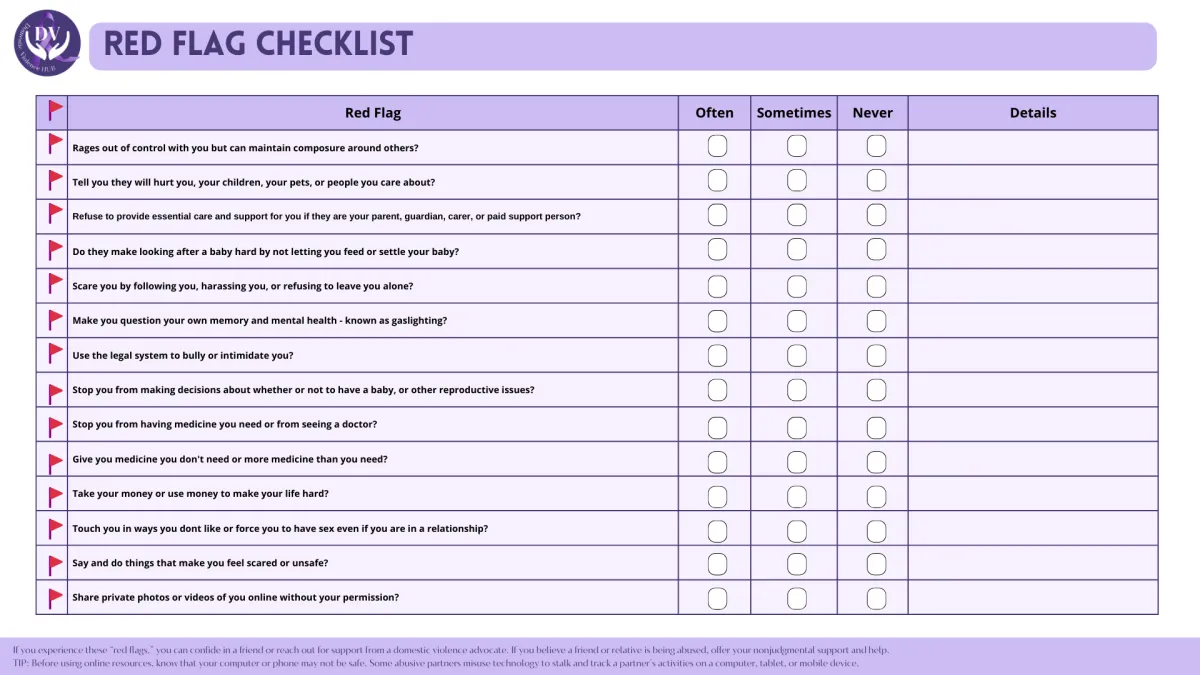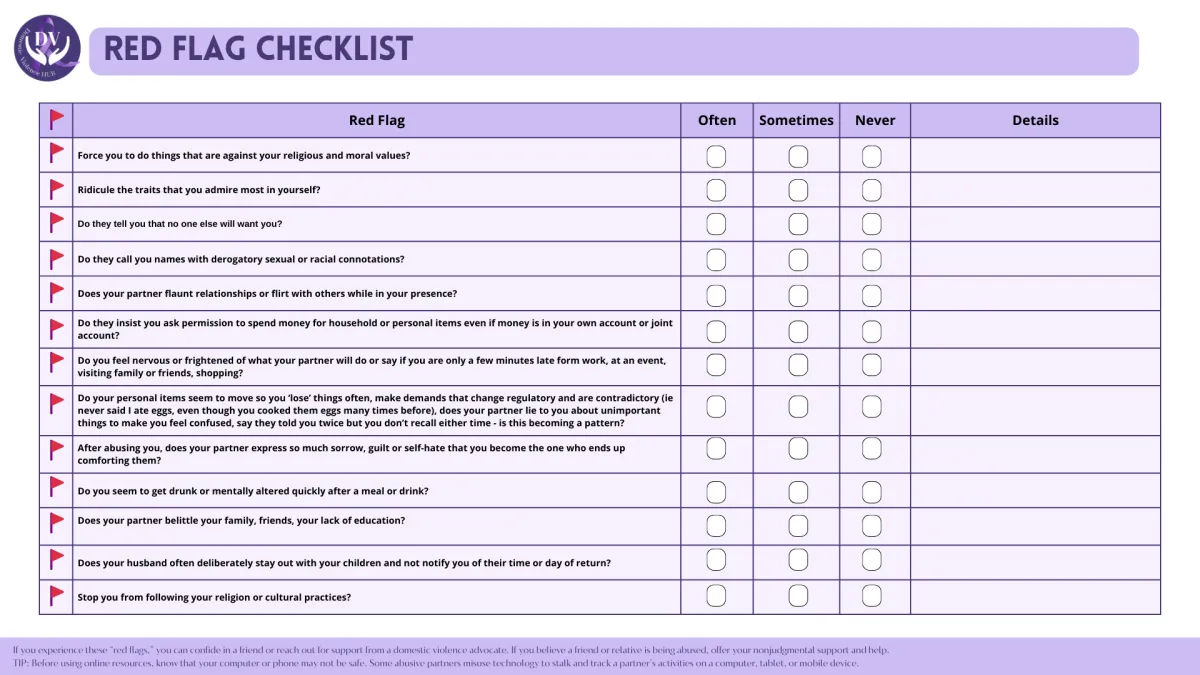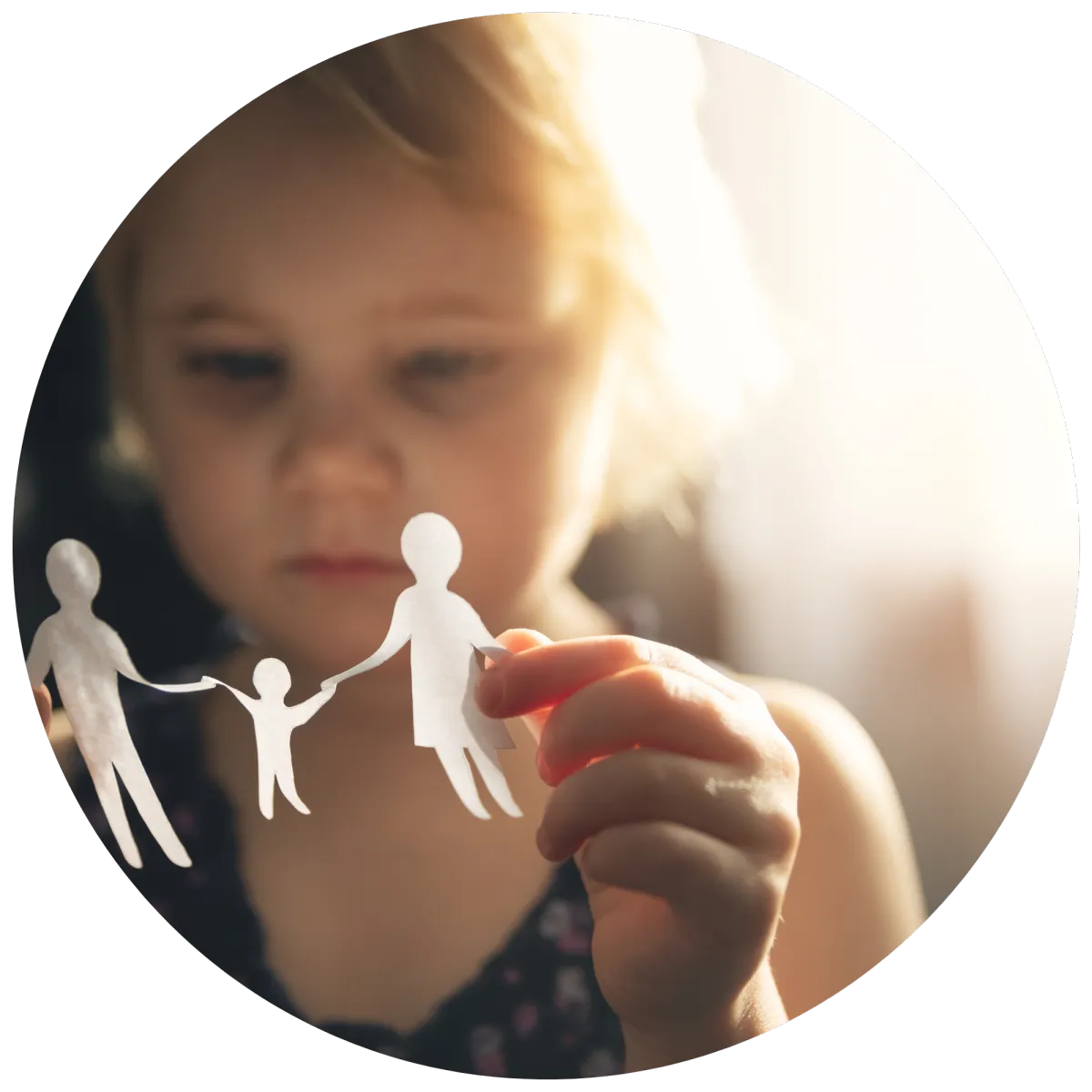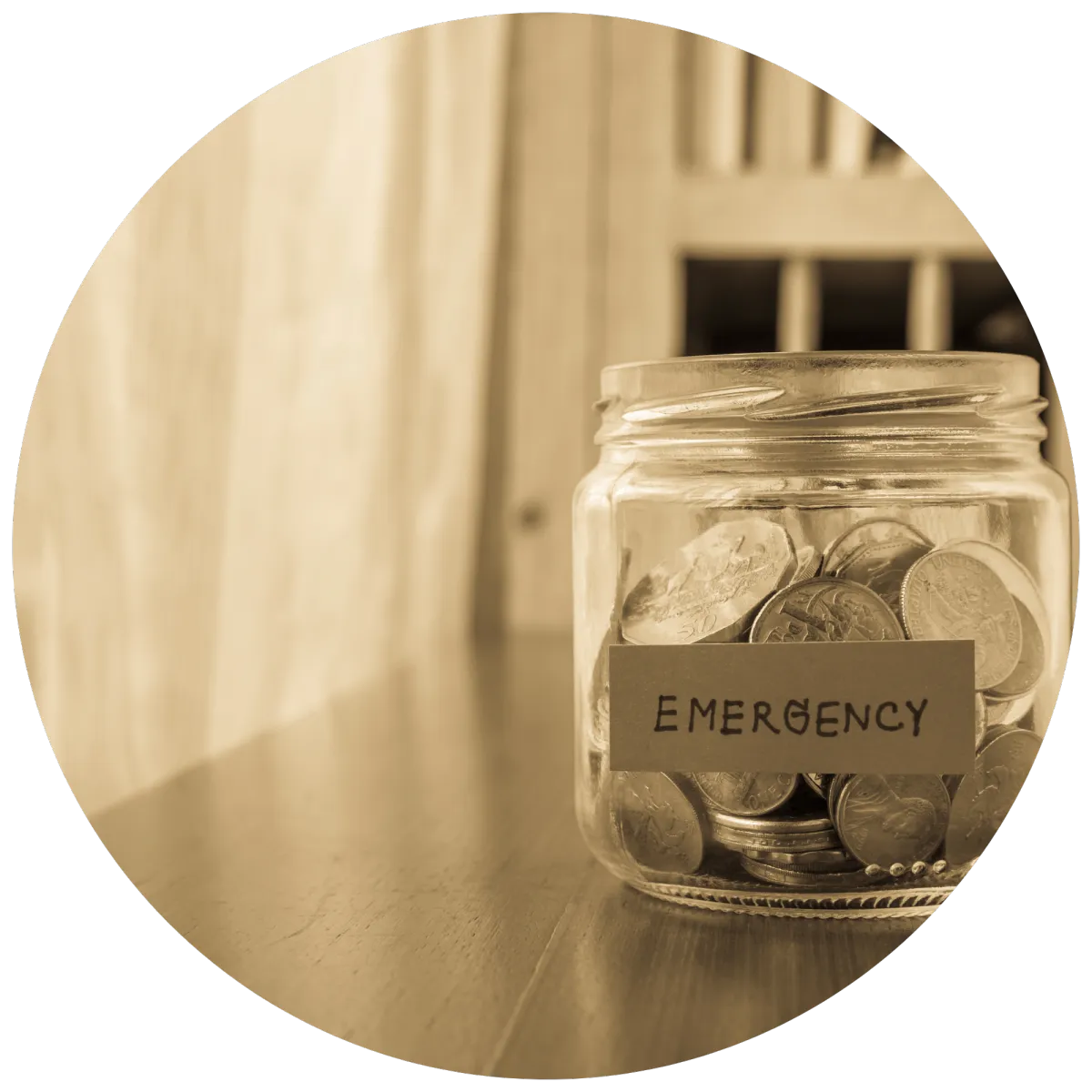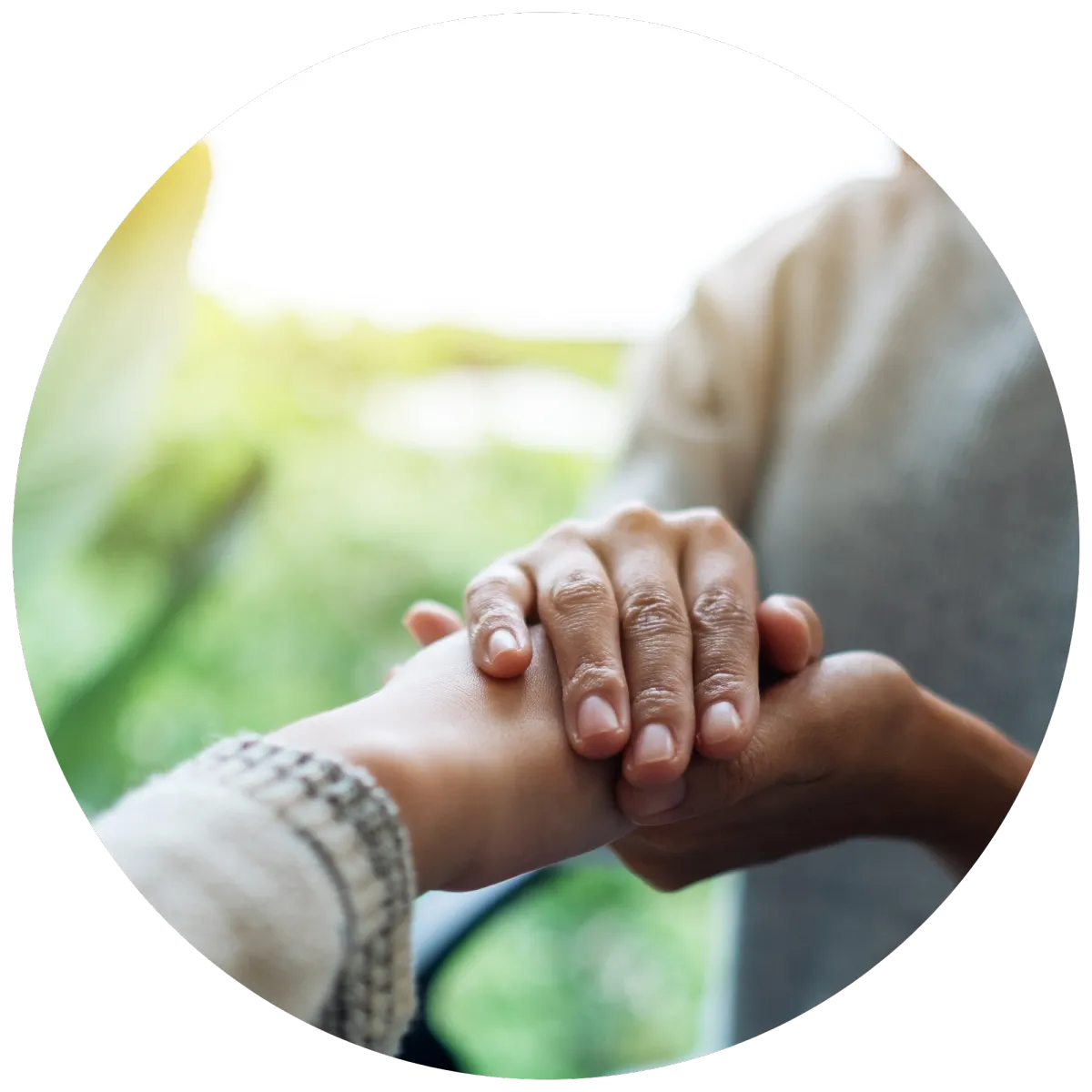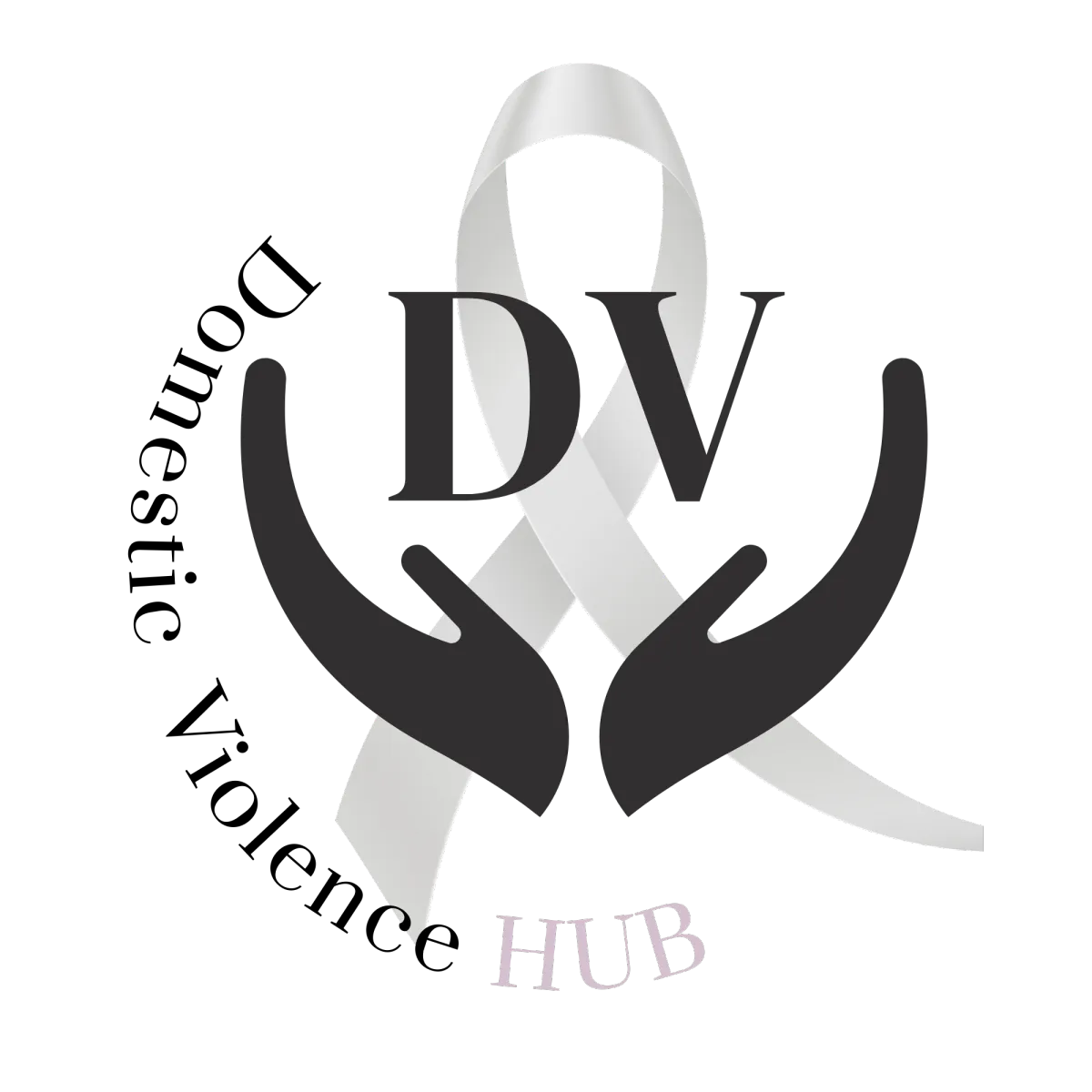Red flags & The Abuse Cycle
The DV Support Hub, provides FREE consolidated information on Australian domestic and family violence matters.
It is just one of the many hubs provided for free through Family Counselling Support Network, to Australians. If you, or are family member, are facing family and domestic violence or supporting someone who is, this hub provides information, resources and a guide on how to find support, keep safe, access resources and move forward safely with independence and greater confidence.
We endeavour to keep this information as up to date as possible.
This site is dedicated to the memory of all those who have lost their lives and the resilience of survivors.
If you have arrived at this hub because you or your loved one or friend is in need of support, we are extremely proud of you.
If you have arrived at this hub because you are seeking support to help find solutions to deal with your emotions, great move, we are also here for you to get the support you need.
Please know there is love and support for you. You've Got This.
There is never an excuse for abuse.

Early warning signs - RED FLAGS 🚩
Checklists for you, your children, your loved ones and friends.
What does a respectful versus non-respectful relationship look like?
The Cycle of Abuse - and how you can hop off!
You can do it! xxx🫂
Why don't they just leave....
Why did they go back....
Providing someone support through the cycles
RED FLAGS BEWARE 🚩🚩🚩🚩🚩🚩
As a society we need to unite. We need to teach our loved ones, our children, our grandchildren, our friends, about the types of behaviours that they should NEVER expect NOR ever deserve in any relationship. The warning signs to be aware of.
They may have witnessed abuse in their pasts, be almost seemingly desensitized to witnessing trauma, have experienced abuse first hand, but that should not continue to be the reason they endure it or tolerate it in a relationship. The more educated our loved ones and friends, community and workplaces are, on what is acceptable or not acceptable behaviours, the better!
It is up to us, to keep the conversation going, to continue the education about what is acceptable or not, what they deserve as humans to endure or what can be done to thrive! We only get one life, don't let our loved ones waste it. No one ever deserves abuse, ever, no matter what excuse another person suggests.
Respectful Relationships
The relationship that you have with your partner is an important part of your life and directly impacts on your emotional, mental and physical wellbeing. Respectful relationships are based on trust, honesty, fairness, and equality.
In a respectful relationship you can be honest with yourself and with your partner. You bring out the best in each other, trust each other’s decisions, and know that your partner accepts that the best person you can be is the person you are!
In a respectful relationship:
• You don’t have to do everything together; it’s healthy to have different interests and opinions
• You’re prepared to compromise. Sharing decision-making is fair and equal
• You can be honest with each other while respecting your partner’s opinions and feelings
• You trust one another, going out with your own friends (male or female) is okay
• You have your own support team, working together and helping each other toward your individual and shared goals
• You accept that there are good times in a relationship and times when you need to be tolerant and accepting of your partner’s differences
• You are able to communicate your thoughts and feelings
A relationship is not a respectful relationship where:
• You are constantly trying to please your partner to avoid conflict
• Your partner’s disrespect of you is copied by your children
• You’re made to feel that your opinions aren’t as important as your partner’s
• Your partner blames their use of alcohol or drugs on your behaviour
• You feel that you are unsafe
• Your partner demands to know who you are with and where you are
WHAT EFFECT CAN A RELATIONSHIP THAT IS NOT RESPECTFUL HAVE ON YOUR LIFE:
• Poor sleep habits
• Nausea or headaches
• Depression or anxiety
• Low self confidence or esteem
• Change in eating habits (over or under-eating)
• Neglect of general health needs (eye sight, teeth) due to partner restricting finances
• Lack of trust in friends and family • Abuse of drugs and alcohol
WHAT YOU SHOULD KNOW IF YOU ARE IN A RELATIONSHIP THAT IS NOT RESPECTFUL:
• You are not alone; there is a range of confidential services that you can contact to discuss your relationship
• Physical violence is one form of abuse that you may find in an unhealthy relationship, but psychological, financial, verbal, social, economic, sexual and spiritual abuse are equally harmful
• There is no excuse for any type of abuse
• Verbal and psychological abuse may change to physical abuse over time
• It takes courage to seek help
Resource:
COMPLETE THE RED FLAG CHECKLSITS - Are you or your loved one potentially at risk?
(Editable PDF which you can print and keep if safe to do so)
The Abuse Cycle - Let us help you to step off the merry go round.
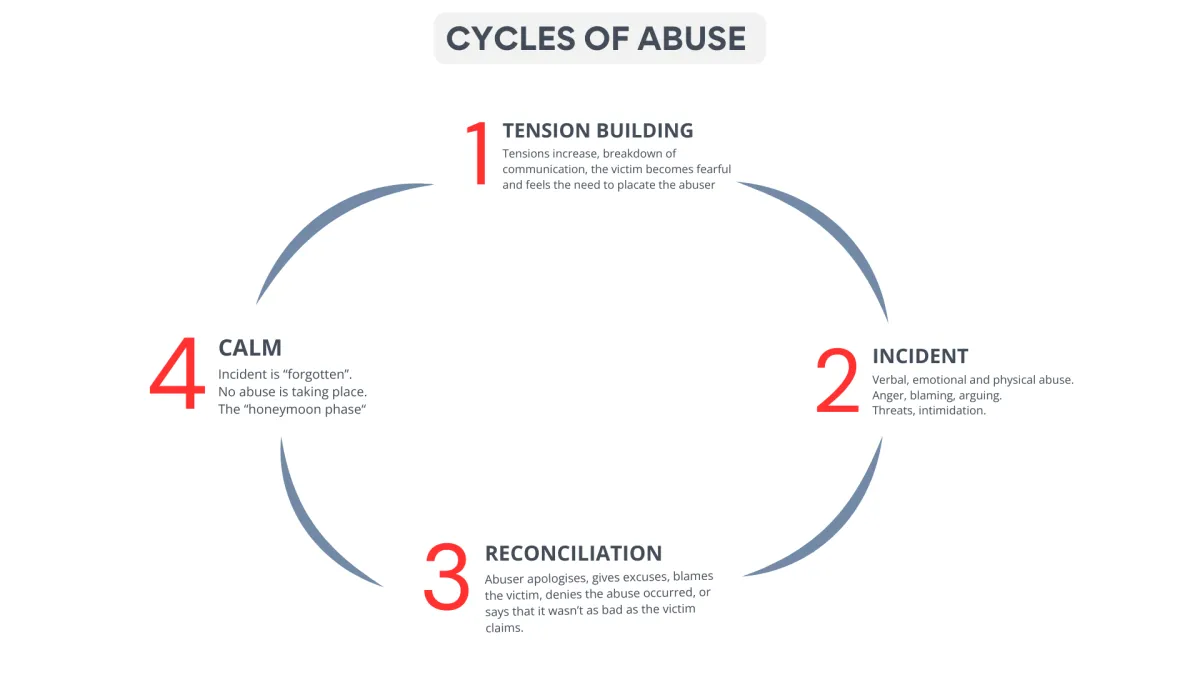
THE CYCLE OF ABUSE - THE FOUR STAGES
The cycle of abuse theory describes the phases of an abusive relationship in the lead up to and following a violent event. The model looks at the repeated actions of a perpetrator, and how it impedes a victim’s ability to leave an abusive relationship. Once you are aware of this cycle it is much easier to notice the signs of it in your relationship or in a loved one's/friends relationship.
Abuse doesn’t look the same for everyone or in every situation. Even in the same relationship, abusive behaviors can change from time to time and, in some cases, they may appear to stop before they suddenly show up again.
It can be possible to end this cycle of abuse. But your safety is the most important thing. You cannot risk your health and safety (or your families) hoping that a person will stop the cycle and change their abusive ways. You’re not alone and support is available
Abusive behaviors may escalate from cycle to cycle, although this isn’t always the case.
The cycle of abuse often goes through four main stages: tension, incident, reconciliation, and calm.
stage 1: tension building stage
stage 2: incident of violence stage
stage 3: reconciliation stage
stage 4: calm
This model of a cycle of abuse does not however cover all experiences related to abuse, or look the same for everyone and they don’t imply abusive behaviors take a “break” every now and then.
The stages of the cycle of abuse may not always happen in the same order, or some of them may not happen in some cases. Abuse can be — and is for many people — without any downtime. It’s also possible that the cycle involves transitioning between different types of abuse. For example, emotional abuse could dominate the building tension, reconciliation, and calm stages, while sexual or physical abuse may increase during the incident stage.
Tension building stage
During the tension stage, the abusive partner may begin to display signs of abuse and behaviors that slowly increase in intensity and frequency. This is may be related to external stressors like financial difficulties, addictions, interpersonal challenges at work or other environments, or health challenges.
The increasingly tense behaviors can include:
- emotional outbursts
- irritability
- impatience
- shortness of temper.
As the outside world starts to feel more out of control, the abusive person may start to turn to the relationship as a way of feeling in control again. As the tension starts to become evident, the non-abusive partner may also feel increasingly anxious. This may lead them to act in specific ways — such as “walking on eggshells” — to ease and appease the abusive partner’s tension and prevent an abusive incident.
Incident of violence stage
At some point, the tension from the first stage in the cycle of abuse starts to break. This may culminate in one or more abusive incidents.
This stage is the abusive partner’s attempt to overtly regain a sense of power and control.
An abusive incident may look different every time or from relationship to relationship. It’s possible that the incident stage escalates with every cycle. For example, intimidation and insults may be present in the first few cycles, transitioning to physical violence later on in the relationship.
Reconciliation stage
After the incident of abuse, the abusive partner may feel like the tension starts to disappear. This can be quite the opposite experience for the person who’s on the receiving end of that abuse.
Once that tension has significantly reduce or essentially disappeared, they may feel like they want to apologize, shower you with affection, or promise they’ll never do it again. They may seem very romantic, supportive and loving suddenly in this stage.
During this phase, the abusive partner may seem genuinely ashamed of their behavior and committed to reform. Because you care about them, you may feel inclined to believe what they’re saying and give them another chance.
Calm stage
During the calm phase, your partner may continue to be attentive; however, you might notice a shift from them being apologetic to now excusing their actions.
During the calm stage, abusive behaviors may be a lot less but you may notice that they:
-shift responsibility for the abuse (“I’m sorry but it’s all because of so-and-so.”)
-justify their behavior (“If the garbage man didn’t do that, I wouldn’t get so angry.”)
-gaslight you (“It really wasn’t that big of a deal.”).
This stage can feel confusing. Your partner seemed to want to make things right, but there’s now an underlying tone of dismissal and the apology no longer seems sincere. After a while, you may start to experience tension again, as the cycle of abuse potentially starts again.
How to end the cycle of abuse
Stopping abuse isn’t as easy as “just leaving.” It’s natural if you feel afraid for your safety, the safety of your kids, or the welfare of your pets or feel you don’t have the resources to exit the situation. These are all common situations that many abusive partners may take advantage of to try and keep you from leaving.
In the case of emotional abuse or coercive control, you may not even yet realize you’re in an abusive cycle! You might have just got used to their 'awful behaviour and 'put downs' to make you feel like ####.
But it is possible to leave an abusive relationship and it may start with identifying those toxic behaviors you won’t tolerate or behaviours others would never expect you to tolerate - would you expect your best friend, mother, sister, daughter, coworker, neighbour to ever put up with this - why should you?
TIPS TO HELP YOU BREAK THE CYCLE - YOU CAN DO IT. ❤️❤️❤️❤️❤️❤️❤️❤️
Confide in someone
Speaking with a trusted friend or family member can help you see — and often verify — patterns of behavior that may indicate abuse. It may also help you find a safe space where to go if you need to leave.
Counselling/Psychological help
A professional such as a counsellor or psychologist can help you navigate relationship challenges and identify signs of abuse.
They can also support you in really considering new thoughts and behavioral patterns that can lead to coping skills and greater confidence as well as providing safe exit plans for exiting this unacceptable situation.
Rebuild your confidence
You have every right to be in a safe and in a respectful relationship. You may not feel that way right now, or feel you deserve it or will ever “find anyone or anything better,” but this is what an abusive and controlling partner will likely want you to believe - and this is often their way of stealing your confidence, your self worth and power.
Try to go back to the focusing on the things that give you joy and confidence and remind you of your self worth and why you do not need to put up with this. Before you were forced to endure this unacceptable behaviour, Who were you? What did you love? What made you smile? Who were your people?
You may not feel capable of doing the exercise, but if you can write down 5 things you are great at (if you can't think, what would others think are your positive traits and abilities).
Consider connecting with loved ones and/or friends you haven’t seen in a while.
Try to spend some time engaging in relaxation techniques that may protect your mental well-being and protect your overall wellness through this such as exercise, music, meditation, breath work, yoga.
Seek outside help
Not everyone’s abusive situation is the same. You may not feel safe ending the cycle of abuse on your own, and that’s OK. You’re not alone and help is available - reach out to 1800 Respect (1800 737 732) for excellent resources and support to help you make the right options to keep you safe and find the strength to remove yourself from a situation you do NOT deserve.
If you’re living with anxiety or depression, trauma and/or PTSD, getting support may be essential. Seek help from the experts. Get a mental health plan from your GP if you need financial assistance to access reduced fees for psychologists who are well trained in trauma.
If you need to get access to separation support, reach out to Separation Support Network who have many clients across Australia seeking affordable and emotionally supportive guidance through the process, at a more affordable rate. www.separationsupportnetwork.com
But why don't they just leave?
Why don't they just leave?
There are a number of reasons why victims stay with their abuser. It is important to realise that victims do not stay in abusive relationships because they enjoy being abused. Rather, they usually have very real, compelling reasons for staying.
No matter the circumstances, survivors deserve to be supported in their decision-making and empowered to reclaim control over their own lives. Don't judge. Offer the support and love they need to find the strength to leave the abusive relationship instead.
Nearly one in three Australians think that women who do not leave violent relationships are responsible for the abuse continuing, when in fact, the responsibility for the violence rests with the perpetrator. This myth shifts responsibility for violence from the perpetrator and fails to recognise why many women are not able to leave abusive relationships.
Studies have shown some of the reasons survivors may stay in abusive relationships include:
🫂FEAR
Generally, victims stay because the fear of leaving is greater than the fear of staying. Fear of the unknown can be a powerful reason for “staying put.” Also, victims are often threatened with physical harm if they try to leave. It is well documented that victims are at the most risk of injury when they are leaving. They fear for their safety and the safety of those who help them.
🫂CONTROL
Many victim’s feel that they have more control by remaining in an abusive relationship. They know their abuser’s whereabouts and moods and therefore know how to act in the way that will be least likely to trigger their temper. The victim fears that if they attempt to leave, the violence could extend to their family or friends who are helping them escape.
The victim’s identity has been lost because for the duration of their relationship the abuser has made many of their life choices for them. The abuser has encouraged or completely forbidden the victim to see their friends and perhaps even keep their job, which means they are completely reliant on the abuser for financial and emotional support.
🫂PROMISES TO CHANGE
The abuser promises that it will never happen again; the victim wants to believe that this is true.
🫂GUILT
The victim may believe that the abuser is sick and needs their help. The idea of leaving can thus produce feelings of guilt. The victim may be the only person who hasn’t left the abuser, so they feel a sense of responsibility to help them.
🫂LACK OF SELF ESTEEM
The victim may come to believe that they somehow deserve the abuse. The abuser has destroyed any sense of self-esteem they once had and therefore they now may believe that they don’t deserve anything better.
🫂CHILDREN & PETS
Being a single parent is a strenuous experience under the best of conditions, and for most victims, conditions are far from the best. The enormous responsibility of raising children alone can be overwhelming. Often, the abuser may threaten to take the children away from them if the victim leaves or attempts to leave. The worry of still having to possibly co-parent with the perpetrator.
🫂LOVE
Experiencing abuse and feeling genuine care for a partner who is causing harm are not mutually exclusive. Survivors often still have strong, intimate feelings for their abusive partner. They may have children together, want to maintain their family, or the person abusing them may simply be charming (especially at the beginning of a relationship) and the survivor may hope that their partner will return to being that person.
🫂FINANCES & LACK OF RESOURCES
Survivors may be financially dependent on their abusive partner or have previously been denied opportunities to work, a place to sleep on their own, language assistance, or a network to turn to during moments of crisis. These factors can make it seem impossible for someone to leave an abusive situation.
🫂NORMALISED ABUSE
If someone grew up in an environment where abuse was common, they may not know
what healthy relationships look like. As a result, they may not recognize that their partner’s behaviors are unhealthy or abusive.
🫂SHAME
It can be difficult for someone to admit that they’ve been or are being abused. They may feel that they’ve done something wrong, that they deserve the abuse, or that experiencing abuse is a sign of weakness. Remember that blame-shifting is a common tactic that their partner may use and can reinforce a sense of responsibility for their partner’s abusive behaviors.
🫂DISABILITY
If someone depends on other people for physical support, they may feel that their well-being is directly tied to their relationship. A lack of visible alternatives for support can heavily influence someone’s decision to stay in an abusive relationship if they have a disability.
🫂IMMIGRATION STATUS
People who are undocumented may fear that reporting abuse will affect their immigration status. If they have limited English proficiency, these concerns can be amplified by a confusing and convoluted legal system and an inability to express their circumstances to others.
🫂CULTURAL CONTEXT
Traditional customs or beliefs may influence someone’s decision to stay in an abusive situation, whether held by the survivor or by their family and community. Learn more about in different cultural contexts
.
No matter the reason, leaving any relationship can be difficult; doing so in an abusive situation can feel impossible without the right access to support.
Let's help them find that support - DV SUPPORT HUB! x
But why did they go back.....
Why Do Domestic Violence Victims Return to Abusers?
Many victims return to abusive relationships. The reasons are extremely varied, and very similar to those exact reasons they may have struggled to leave in the first instance. Making a person feel guilty about their decisions in counter-productive and not the support they need.
The reasons may include:
➡️Financial, accommodation and access to other key resources and support
➡️Miss their children, pets, extended family or the social circle they share with the abuser if they have become isolated from them.
➡️They find co-parenting with the abuser very difficult and fear for the children with the abuser alone or at handovers
➡️Haven't been able to access emotional support or an ability to deal with their trauma, depression and negative self-perception and worth
➡️Inadequate assistance from formal support systems, or law enforcement, child custody and legal issues
➡️Difficulty breaking the emotional bond with the abuser
➡️Emotional guilting by extended family and/or friends and/or culture.
Many survivors do live on their own for a period of time as their injuries heal, only to miss the routine of family life, even with the abuse. They may compartmentalize the violence as only one facet of the relationship, and decide to return.
Leaving an abuser is a very significant decision in the life of a domestic and family violence victim, particularly when they are deciding to leave a relationship of many years, often with children and extended family involved. Having bravely made the decision to leave, the question of whether they will return is often dependent on the overall support they and their children and pets can receive.
Need the help to feel Empowered to Make a Fresh Start
Securing help for victims involves compassion and empathy, as well as material assistance. This is has to start ideally before the decision to leave and then the provision of ongoing wrap around support emotionally, socially, physically, mentally, financially and legally to keep these survivors bravely removed from the abusive relationships and on their road to recovery.
Supporting someone who is wanting to return to an abusive relationship
It can be so difficult to watch someone you care about deal with an abusive relationship. Even more difficult is watching that person leave and return to their partner, time and time again. You might feel frustrated, angry or you may even feel like giving up on your friend or family member. You might not know how to keep supporting someone who keeps returning to an abusive relationship. These are all totally normal and understandable feelings to have.
But it’s important to remember that domestic violence is extremely complex. Leaving an abusive relationship is never easy – and it isn’t always the safest option. In fact, survivors of abuse return to their abusive partners an average of seven times before they leave for good. That may sound unbelievable or unreasonable to a person who has never experienced abuse.
As frustrating as this may be, someone in a position to support a survivor can play a crucial role in empowering them to stay safe or even leave for good. It’s important to continue supporting someone who keeps returning to an abusive relationship because their well-being and safety may be at risk.
If you find yourself in this role, you might ask yourself: what can you do to make sure you are staying helpful and supportive?
Educate Yourself
Let Your Loved One Know That You’re Concerned
Listen and Support Their Decisions
Encourage Small Steps and Help Them Find Options Specific to Their Needs
Practice Self-Care for you as the supporter. Supporting someone who keeps returning to an abusive relationship can be a challenge. Not only is it hard to see your friend experience such terrible things, but it can bring up frustration as well. Remember that abuse is complex, with no easy answers. If you’re uncertain about how to support someone who keeps returning to an abusive relationship, reach out to 1800 Respect. You are not alone.
Domestic & Family Violence Hub Directory
Blog Posts
No blogs found
This site is brought to you by Family Counselling Support Network
Book in with one of our professionals today
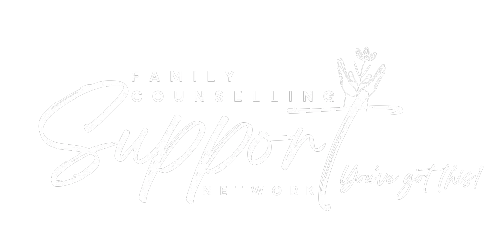


We are committed to protecting your personal information and respecting your privacy. This website uses cookies to analyze website traffic and optimise your website experience. By accepting our use of cookies, your data will be aggregated with all other user data.
DISCLAIMER: The material contained on this website is for general educational and information purposes only and is not a substitute for professional legal, financial, medical or psychological advice or care. While every care has been taken in the information provided, no legal responsibility or liability is accepted, warranted or implied by the authors or Family Counselling Support Network and any liability is hereby expressly disclaimed. For specific advice please contact us at [email protected]. All information contained on the website remains the intellectual property of Family Counselling Support Network and is for your personal educational use only. The information must not be reproduced or distributed without the express permission of Family Counselling Support Network.
Family Counselling Support Network acknowledges and respects the First Nations Custodians of the land where our offices stand, and where we work to help Australians. We pay respects to their Elders, past present and emerging, lore, customs and creation spirits. We recognise that these lands have always been places of ceremony, teaching, research and learning, and we acknowledge the important role Aboriginal and Torres Strait Islander peoples play in our community.
We are committed to providing an inclusive and accessible environment where people and communities of all identities and backgrounds are accepted, safe and celebrated.
Privacy Policy | Terms and Conditions
